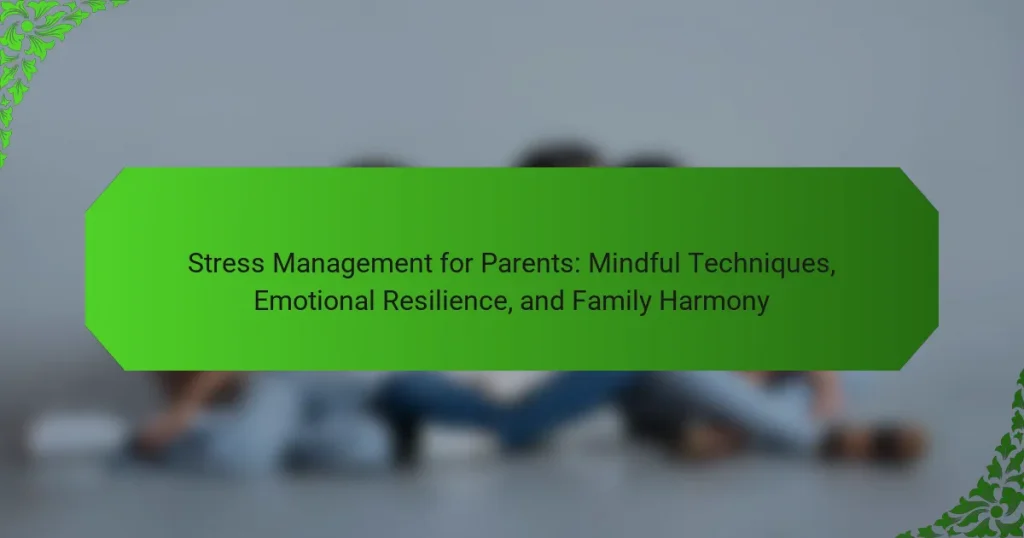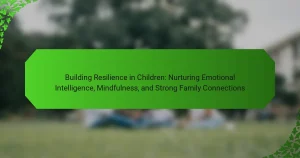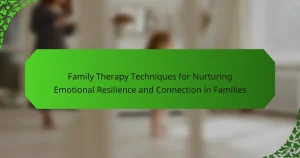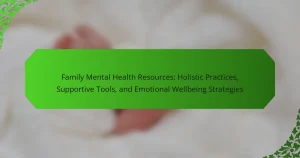Managing stress is crucial for parents facing unique challenges in balancing work and family life. This article explores mindful techniques like deep breathing and meditation, emotional resilience strategies through positive self-talk, and fostering family harmony via open communication. Prioritising self-care and setting boundaries will also be discussed to help maintain overall well-being.
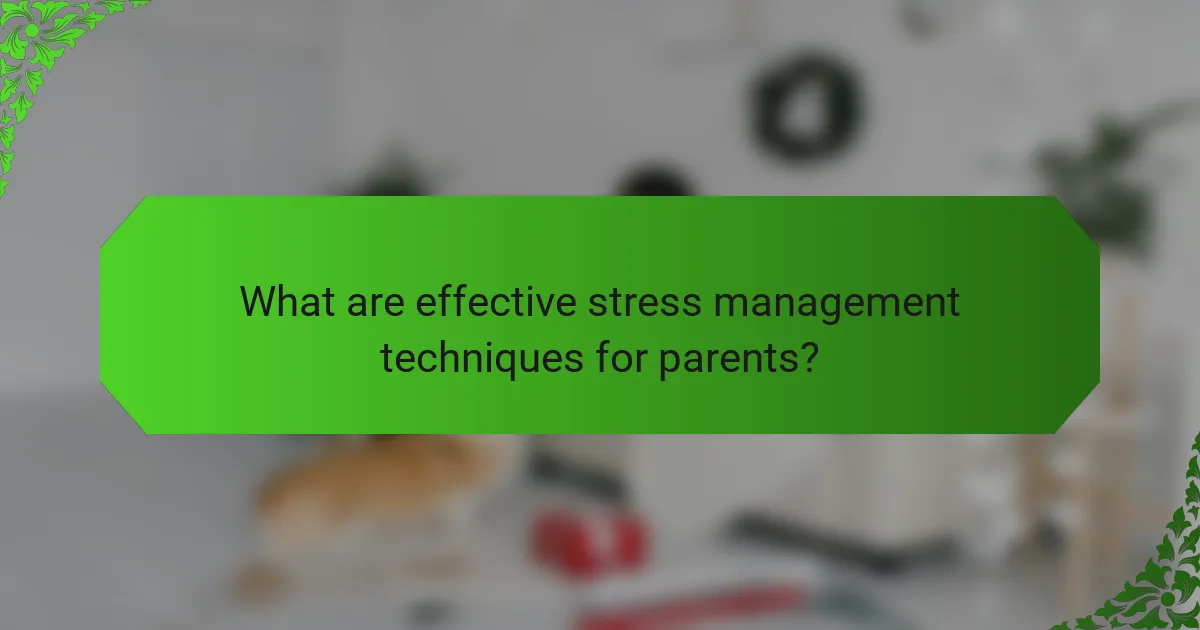
What are effective stress management techniques for parents?
Effective stress management techniques for parents include mindfulness practices, emotional resilience strategies, and fostering family harmony. Mindfulness techniques, such as deep breathing and meditation, can help parents stay present and reduce anxiety. Building emotional resilience through positive self-talk and support networks strengthens coping mechanisms. Encouraging open communication within the family promotes harmony and understanding, reducing overall stress levels. Prioritising self-care and setting boundaries is essential for maintaining balance and well-being.
How can mindfulness practices reduce parental stress?
Mindfulness practices significantly reduce parental stress by promoting emotional resilience and enhancing family harmony. Techniques such as meditation and deep breathing encourage parents to focus on the present, which alleviates anxiety and fosters a calm environment. As a result, parents can respond more effectively to challenges, leading to improved interactions with their children. Regular mindfulness practice has been shown to lower cortisol levels, the hormone associated with stress, thereby contributing to overall well-being. This unique approach not only benefits individual parents but also strengthens family dynamics.
What are simple mindfulness exercises for busy parents?
Mindfulness exercises for busy parents include deep breathing, body scanning, and mindful walking. These techniques enhance emotional resilience and foster family harmony.
1. Deep Breathing: Take a few minutes to inhale deeply through the nose and exhale through the mouth. This reduces stress and promotes relaxation.
2. Body Scanning: Spend five minutes focusing on different body parts, releasing tension as you go. This practice increases self-awareness.
3. Mindful Walking: Engage in a short walk while paying attention to each step and your surroundings. This enhances focus and clears the mind.
4. Gratitude Journaling: Write down three things you are grateful for each day. This cultivates a positive mindset and emotional balance.
Incorporating these practices into daily routines can significantly improve stress management for parents.
How can breathing techniques help in stressful situations?
Breathing techniques can significantly reduce stress during challenging situations. These methods promote relaxation, enhance emotional resilience, and improve focus. For instance, deep breathing activates the body’s relaxation response, lowering heart rate and blood pressure. As a result, parents can maintain calmness, fostering family harmony. Practicing techniques like diaphragmatic breathing for just a few minutes can lead to immediate stress relief, making it easier to handle parenting challenges effectively.
What role does emotional resilience play in parenting?
Emotional resilience is crucial in parenting as it enhances stress management and fosters family harmony. Parents with strong emotional resilience can navigate challenges effectively, maintaining a calm environment for their children. This adaptability leads to healthier parent-child relationships and promotes emotional well-being in the family. Research indicates that resilient parents are better equipped to model coping strategies, teaching children how to handle stress and adversity. By prioritising emotional resilience, parents contribute to a supportive atmosphere that nurtures growth and stability.
How can parents build emotional resilience in themselves?
Parents can build emotional resilience by practicing mindfulness, developing coping strategies, and fostering open communication. Mindfulness techniques, such as meditation or deep breathing, help parents manage stress effectively. Establishing coping strategies, like problem-solving and positive reframing, enables parents to navigate challenges with confidence. Encouraging open communication within the family promotes emotional expression and strengthens relationships, creating a supportive environment that enhances resilience. Regular self-reflection and seeking support from peers can also contribute to emotional strength.
What strategies can parents use to foster resilience in children?
Parents can foster resilience in children through consistent emotional support, teaching problem-solving skills, and modeling healthy coping strategies. Encourage open communication about feelings to help children express emotions. Practicing mindfulness techniques, such as deep breathing or meditation, can enhance emotional regulation. Engaging in family activities strengthens bonds and provides a sense of security, contributing to a resilient mindset.
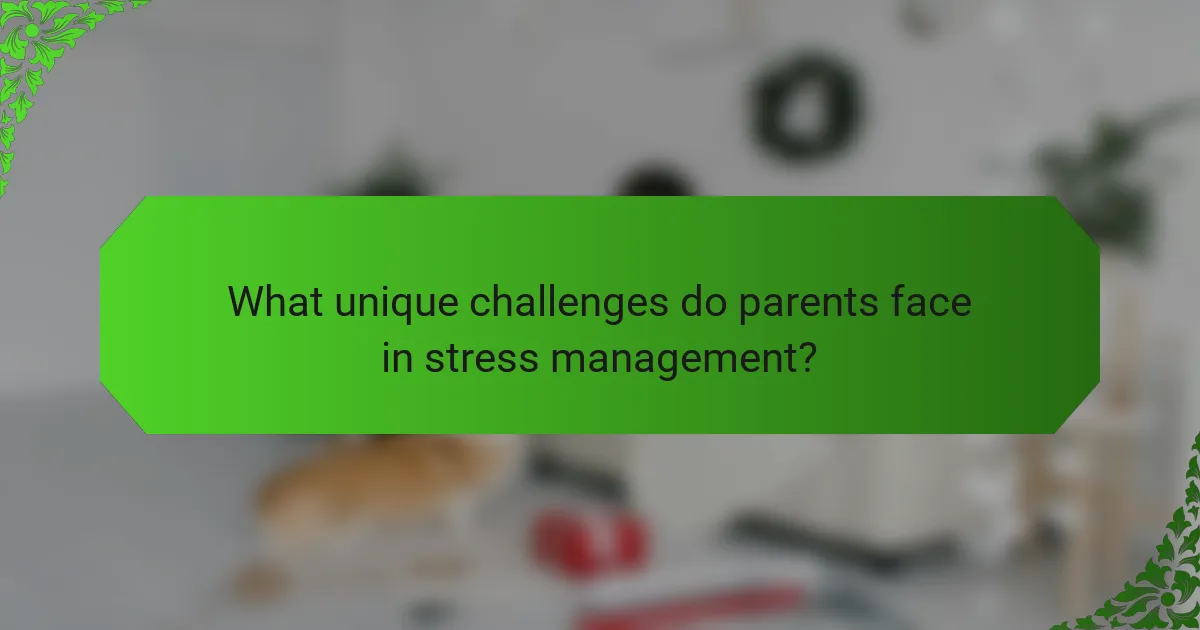
What unique challenges do parents face in stress management?
Parents face unique challenges in stress management due to time constraints, emotional demands, and the need for effective communication. Balancing work, parenting, and self-care often leads to heightened stress levels. Many parents struggle with feelings of guilt and inadequacy, impacting their emotional resilience. Moreover, the pressure to maintain family harmony can create additional stress. Mindful techniques, such as deep breathing and setting boundaries, can help parents navigate these challenges effectively.
How does the family dynamic influence stress levels?
Family dynamics significantly impact stress levels, as supportive relationships can reduce stress while conflict can increase it. A cohesive family unit fosters emotional resilience, enabling parents to manage stress more effectively. Research shows that families with open communication experience lower stress levels, promoting overall family harmony. Additionally, mindful techniques, such as shared family activities, enhance connections and mitigate stress.
What are common stressors in family life?
Common stressors in family life include financial pressures, work-life balance challenges, communication issues, and parenting responsibilities. These factors can create tension and conflict within the household. Addressing these stressors through mindful techniques enhances emotional resilience and fosters family harmony. For example, setting aside dedicated family time can improve communication and strengthen relationships.
How can communication improve family harmony?
Effective communication fosters family harmony by enhancing understanding and reducing conflicts. Mindful techniques, such as active listening and empathetic responses, allow parents to address emotions constructively. Emotional resilience developed through communication helps families navigate challenges together. Regular family discussions strengthen bonds and promote a supportive environment, leading to improved relationships and overall harmony.
What are rare yet impactful stress relief methods for families?
Engaging in rare yet impactful stress relief methods can significantly enhance family harmony. Techniques such as laughter yoga, forest bathing, and family art therapy foster emotional resilience and mindful connections. Laughter yoga combines humor and yoga for stress reduction, while forest bathing encourages mindfulness through nature immersion. Family art therapy promotes expression and bonding, enabling families to navigate stress collaboratively. These unique approaches empower parents to cultivate a supportive environment, enhancing overall well-being.

How can parents create a harmonious family environment?
Parents can create a harmonious family environment by practicing stress management techniques. Mindfulness, such as meditation and deep breathing, enhances emotional resilience. Regular family activities foster connection and understanding. Establishing open communication allows family members to express feelings and resolve conflicts. Setting clear boundaries ensures a balanced home life, promoting overall harmony.
What practices promote family bonding and reduce stress?
Practices that promote family bonding and reduce stress include shared activities, open communication, and mindfulness exercises. Engaging in family meals fosters connection, while regular check-ins encourage emotional support. Mindfulness techniques, such as deep breathing or meditation, enhance emotional resilience and promote harmony within the family unit.
How can family activities enhance emotional wellbeing?
Family activities significantly enhance emotional wellbeing by fostering connection and reducing stress. Engaging in shared experiences cultivates emotional resilience among family members. Research indicates that families participating in regular activities report lower stress levels and improved communication. These interactions create a supportive environment, promoting mental health and harmony within the family unit.
What are the best practices for maintaining mental wellbeing as a family?
To maintain mental wellbeing as a family, prioritise open communication, establish routines, and practice mindfulness. These techniques foster emotional resilience and enhance family harmony.
Encourage regular family meetings to discuss feelings and concerns. This strengthens bonds and promotes understanding. Implement daily mindfulness practices, such as meditation or deep breathing, to reduce stress.
Establishing consistent routines helps create a sense of stability. Schedule family activities that promote connection, like game nights or nature walks. These practices contribute to a supportive environment, essential for overall mental wellbeing.
Lastly, model healthy coping strategies. Parents who demonstrate emotional resilience teach children valuable skills for managing stress and challenges.
What common mistakes should parents avoid in stress management?
Parents should avoid common mistakes like neglecting self-care, dismissing emotions, over-scheduling activities, and failing to communicate openly. These errors can hinder effective stress management and disrupt family harmony. Prioritising personal well-being is essential; parents must model healthy coping strategies. Open communication fosters emotional resilience, allowing families to navigate stress collectively. Balancing responsibilities with downtime is crucial; over-scheduling can lead to burnout. Avoiding these pitfalls enhances mindfulness and strengthens family bonds.
How can parents optimise their stress management techniques?
Parents can optimise their stress management techniques by practicing mindfulness, building emotional resilience, and fostering family harmony. Mindfulness techniques, such as meditation and deep breathing, help parents stay present and reduce anxiety. Emotional resilience can be enhanced through positive self-talk and reframing negative thoughts. Creating a harmonious family environment involves open communication and shared activities, which strengthen bonds and alleviate stress. Implementing these strategies consistently can lead to improved well-being for both parents and children.
